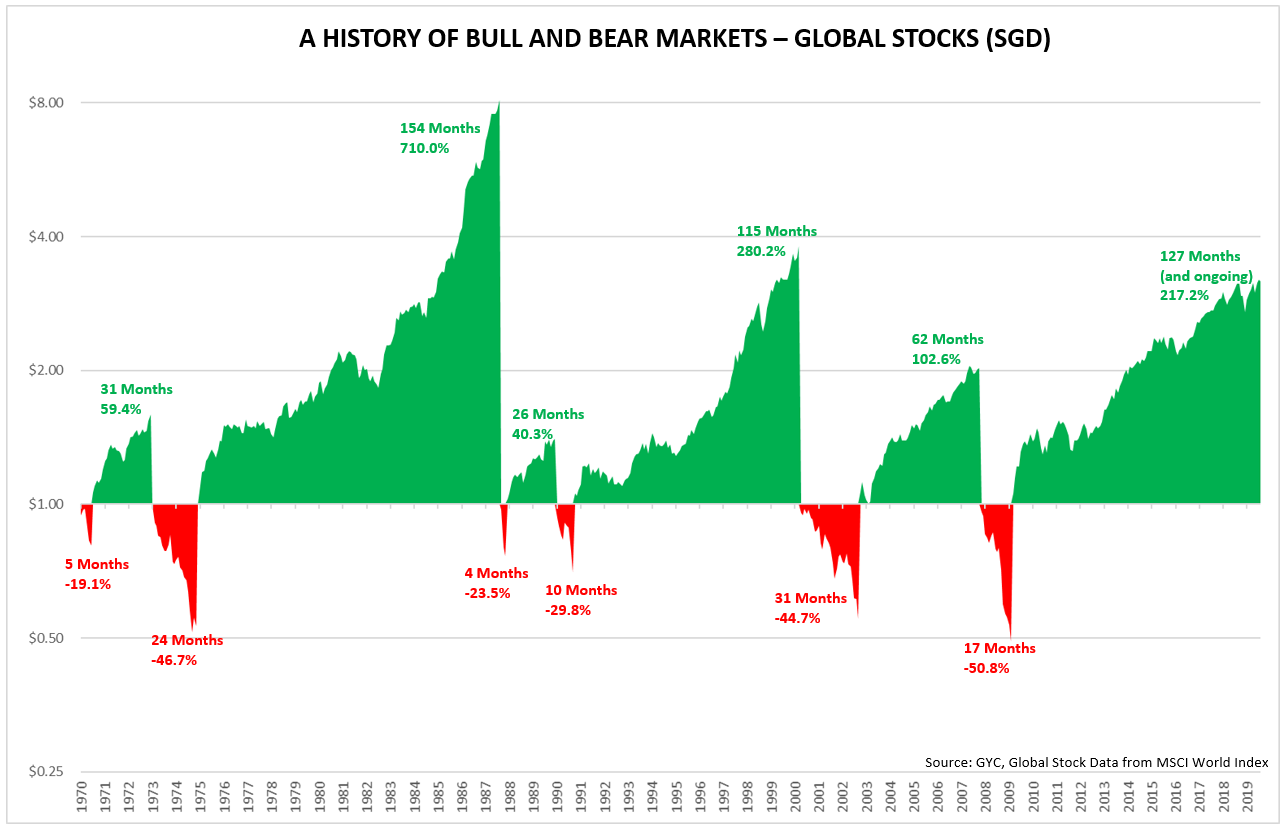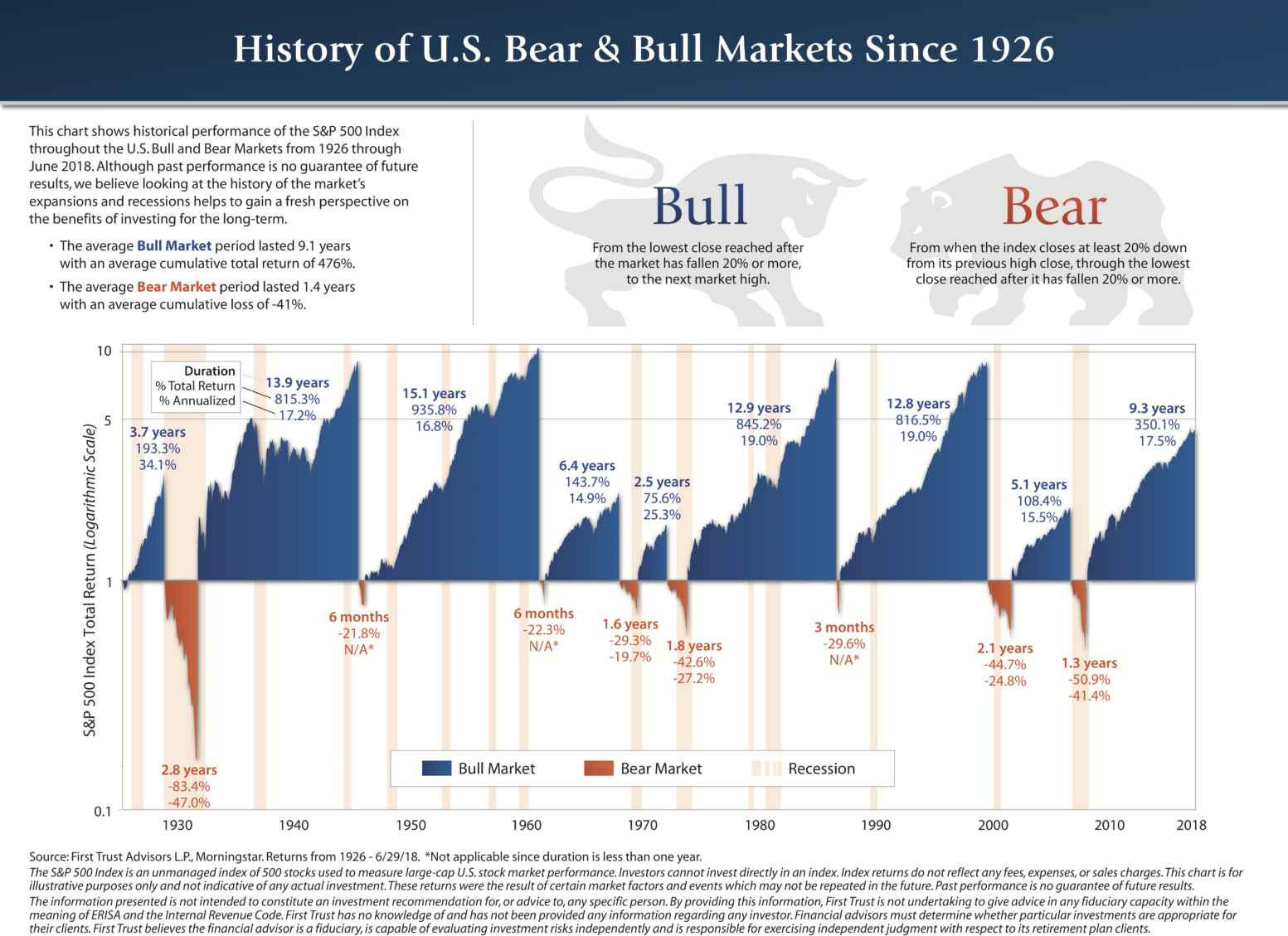Why You Shouldn’t Be Too Bothered by a Stock Market Collapse
11 October 2019

“The true investor welcomes volatility; a wildly fluctuating market means that irrationally low prices will periodically be attached to solid businesses.”
—Warren Buffett
Yes, the stock market will collapse one day. What would cause that? Nobody knows. When would it happen? Again, nobody knows. Despite many investment professionals shouting predictions throughout the years and especially when markets stumble, the truth is that nobody really knows for sure. Anyone who tells you otherwise is fooling you and deluding themselves.
Yet many of us still continue to fret and obsess over when the next stock market collapse will occur. This brings about feelings of pain and angst, especially when thinking about how much money you will lose (on paper, anyway). One possible reason for this obsession is that, over the past 20 years, the stock market value was cut in half twice. Many investors painfully remember those experiences and thus think that every market sell-off would lead to a disaster of similar magnitude.
But is this really true? Looking back at global stock market returns (in SGD terms), we found that the answer is actually ‘no’. Market sell-offs were shorter-lived than stock market rises. And bull markets can go on for years generating vast gains for investors. The chart below shows this in graphical form. If the stock market halved every so often, nobody would allocate capital to it and it would cease to function as a way for companies to raise money to generate further growth.

If we wanted to look at a longer dataset, then the history of bull and bear markets for US markets (see diagram below) has data going all the way back to 1926. It also tells the same story – short sell offs and long bull markets. In addition, you will also notice that:
- Bull markets can go on for a long time, much longer than many investors expect.
- Not every bear market or sell-off is in the -50% range. In general, they range from -20% to -30%.
- Even in bull markets, the market doesn’t go straight up. There are cycles within it.
- The market is a good generator of wealth – provided you hold over the long term and through the cycles.

Most of you would be familiar with another area of life that requires a lot of prediction – weather forecasting. Whilst technology and big data have improved the accuracy of weather forecasts over the years, this interesting article as well as numerous studies continue to show that weather predictions are still far from accurate.
Like investing, there is always a certain level of uncertainty tied to the future. This is why we are paid a return to hold certain investment assets. However, while weather accuracy decreases the farther out you want to predict, the returns from investing in a broad and diversified portfolio of investment assets actually becomes more certain the longer you invest.
A study published by Nobel Laureate Eugene Fama and Kenneth French shows that investment returns converge towards a normal distribution. As such, there is a reasonable expectation to getting certain investment returns when you invest – but only if you buy the market (comprising several thousand stocks), and not one or a few individual stocks.
When looking at stock market crashes, many strategists, analysts and investors commonly rely on what happened in the past to form a basis for their opinions. Common phrases heard are, “The stock market is currently overvalued and is ripe for a correction”, or “The inverted yield curve will cause the stock market to plunge”, or “Plunging bond yields is a recession predictor which will cause the stock market to crash”.
However, when it comes to the market, history doesn’t always provide clarity because there is no one single cause that triggers a market crash. For the global stock market bear markets (see first diagram) that occurred over the years, there was no clear sign that indicators like valuation, bond yields or even the inverted yield curve were causal factors in a stock market sell-off. (See table below.)
| Bear Market Period | Valuation (P/E) | US 10Yr Yield | US 10Yr-3M Spread | Inverted Yield Curve? |
| 1968-1970 | 15.1 | 7.88% | -0.35% | Yes |
| 1973-1974 | 19.1 | 6.41% | 0.90% | No |
| 1987 | 23.4 | 8.97% | 2.82% | No |
| 1990 | 14.7 | 7.94% | 0.31% | No |
| 2000-2002 | 29.8 | 6.00% | 0.14% | No |
| 2007-2009 | 17.0 | 3.94% | 0.81% | No |
During past bear markets, valuation (P/E) ranged from 14.7 to 29.8. So, what would be the correct valuation to indicate that the market would crash? Similarly, bond yields ranged from 3.94% to 8.97%, which does not reliably tell us which level would cause a market collapse. Inverted yield curves were present only during one of the bear markets. Some occurred before and some occurred after the sell-off. So again, what triggers should investors be looking for?
Historically, we have experienced bear markets during periods of high valuations, low valuations, high interest rates, low interest rates, high inflation, low inflation and everything else in between. Fundamentals may help investors set reasonable long-term expectations, but they don’t give you any usable information about what’s going to happen to stocks over the short-to-intermediate term.
At the end of the day, you invest because you know that you need to reach some future goal – be it retirement, funding your children’s university education, taking care of the family or perhaps affording a lifestyle purchase. You do so because you know that leaving money in the bank serves no purpose and will erode away due to inflation. It is important to realise that there will be an inevitable crash or two during your investing journey as markets move in cycles. But more importantly, market cycles are upward trending over the long run and that is what will help you reach your financial goals.
Don’t let fear paralyse you or force you to make poor and uninformed decisions about your money. Working with a fiduciary adviser will help you be better prepared, either mentally or through the physical construct of your portfolio. This will help ease some of the stress in investing and allow you to sleep more soundly.
So, be aware that stock market collapses are a normal part of investing, but riding through the cycles always yields rich dividends for the patient investor.
#
If you have found this article useful and would like to schedule a complimentary session with one of our advisers, you can click the button below or email us at customercare@gyc.com.sg.
IMPORTANT NOTES: All rights reserved. The above article or post is strictly for information purposes and should not be construed as an offer or solicitation to deal in any product offered by GYC Financial Advisory. The above information or any portion thereof should not be reproduced, published, or used in any manner without the prior written consent of GYC. You may forward or share the link to the article or post to other persons using the share buttons above. Any projections, simulations or other forward-looking statements regarding future events or performance of the financial markets are not necessarily indicative of, and may differ from, actual events or results. Neither is past performance necessarily indicative of future performance. All forms of trading and investments carry risks, including losing your investment capital. You may wish to seek advice from a financial adviser before making a commitment to invest in any investment product. In the event you choose not to seek advice from a financial adviser, you should consider whether the investment product is suitable for you. Accordingly, neither GYC nor any of our directors, employees or Representatives can accept any liability whatsoever for any loss, whether direct or indirect, or consequential loss, that may arise from the use of information or opinions provided.









